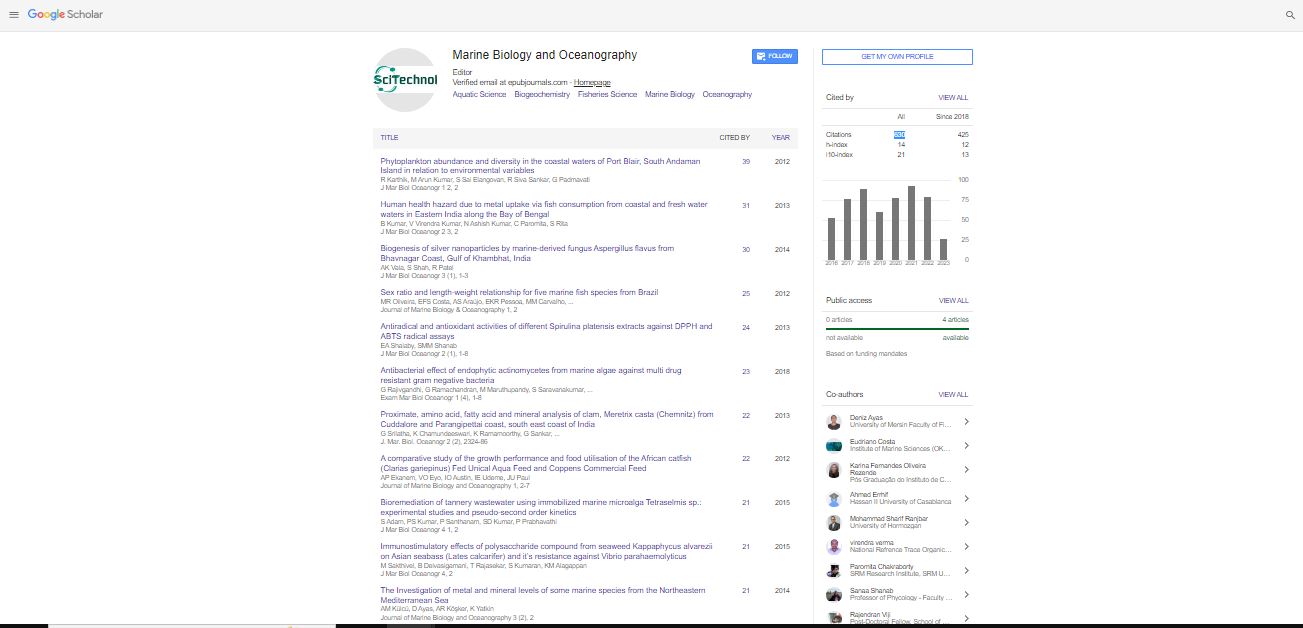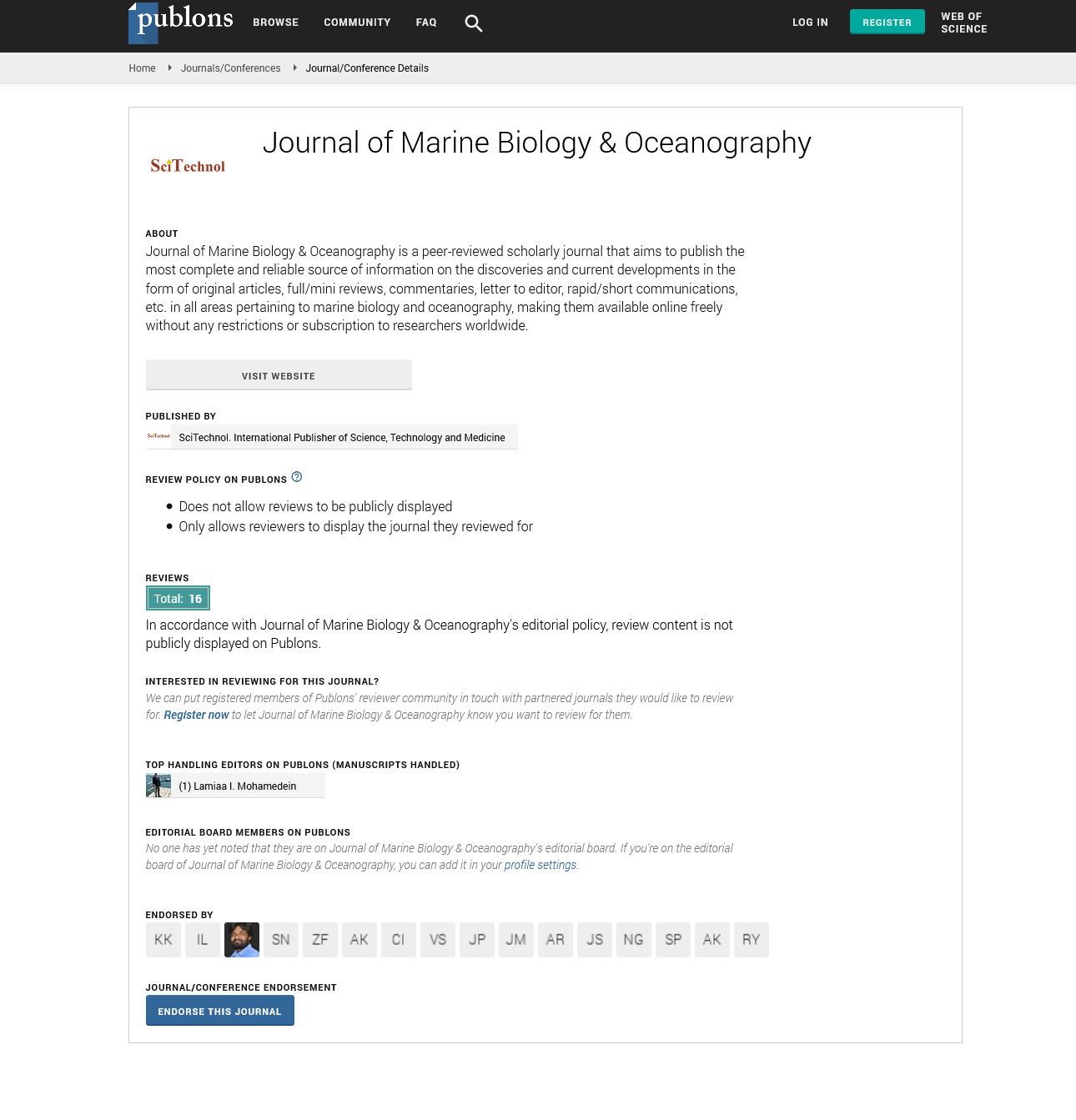Commentary, J Mar Biol Oceanogr Vol: 11 Issue: 4
Expansion in the Marine Social Sciences: Insights from the Global Community
Maria Restello*
Department of Marine Technology, Norwegian University of Science and Technology, Alesund, Norway
*Corresponding author: Maria Restello
Department of Marine Technology, Norwegian University of Science and Technology, Alesund, Norway
Email: restello34@gmail.com
Received date: 07 March, 2022, Manuscript No. JMBO-22-62316;
Editor assigned date: 09 March, 2022, Pre QC No. JMBO-22-62316 (PQ);
Reviewed date: 21 March, 2022, QC No JMBO-22-62316;
Revised date: 31 March, 2022, Manuscript No. JMBO-22-62316 (R);
Published date: 11 April, 2022, DOI:10.4172/2324-8661.1000237
Citation: Restello M (2022) Expansion in the Marine Social Sciences: Insights from the Global Community. J Mar Biol Oceanogr 11: 4.
Keywords: Marine Social Sciences
Description
Cumulative population growth on this planet is compressing the hopes of sustainability of species communities at all biodiversity zones on this world. One among such biodiversity zone is “Aquaculture and Marine ecosystem”, where millions of species transferring their culture or fertility to their offspring for sustaining planet life science. Aquaculture and Marine ecosystem are playing vital role in providing employment, nutritious food, coastal tourism, huge exports and foreign currency etc. In recent years, million tons of pollutants generated with biased practices of human activities shipping into production zones (Benthos or sea bed or ridge or bottom of any surface water body) by catastrophes (Climate change impediments) is demanding a ministerial intervention for achieving sustainable production to meet the demand of seafood under affordable prices. In this contest, governments are pouring billions of rupees or dollars as subsidies to maintain quality for nutrition, safety of community (industry) employment, waste reduction at handling or storage or packing or bio extracting areas and production zones (marine or capture or cage culture). Island and coastal connected countries, which are profiting more with oceans (Seas), sturdily lose their economic system under huge pressure with pollutants. This study elevates the “requirement of innovative technologies” for bringing sustainable practices to entire communities including trade and production” in any specified area.
Cumulative Waste Discharges
Consequences of Climate change with cumulative waste discharges by mature population and the indefensible utilize of resources (agriculture lands, Water reserves, axing forest for wood etc.) are strongly resulting the degradation of nature ecosystem every corner on this planet (land and water). This is strongly devastating economic sustainability and its origins of peace in this world both on land and in water. As we aware that, the geographical structure of land is compressing year by year with actions made by increased temperature (Global Warming), which is strongly muting the sustainability of “aquaculture (capture fisheries), biological production levels and marine ecosystems” at national and international level. As we aware that 90% of the earth’s biomass hold by oceans, which are covered 71% on this planet? The constant discharges of air pollution by human activities (breathing, industrial, cooking, transportation etc.) reaching the surface of aquaculture zones because of “the early heating capacity of earth than water (aquatic zones). These magnificent changes are constantly varying the actions of environment and framing ocean secrets like Bermuda triangle, Nevada Triangle etc.
In recent years, the global climate change consequences became a curse to all the dependent communities like fishermen, business and economies, especially island communities. Island governments are more depend on oceans for keeping strong sustainability in their employment, household income, nutrition levels, purchasing power, exports, foreign currency etc. to flag their nations sovereign by achieving GDP growth. Another side, sea or ocean shore connected 144 nations are enjoying autonomy provided by nature to their citizens, organizations (fishing, shipping, exporting etc.) for reducing the stress in other parts of their economy.
Climate Change Fretfulness on Aquatic Life
Climate Change fretfulness on aquatic life: planet water bodies are the major source for providing life to million water species. They are the part in the Gross Domestic Products in several nations with a contribution of 82.1 million tons of aquatic animals, 32.4 million tons of aquatic algae, 26 000 tons of ornamental seashells and pearls. Cumulative waste discharges of Species (including human discharges) and climate change impediments (flash Floods, gales, tornados etc.) are gathered 4 to 12 million tons of waste (Reference 05) (plastic, sewerage, sewage, silt, industrial chemicals persistent organic pollutions, oil spills, marine letters etc.), Naturally-Occurring Radioactive Materials (NORM) with mining activities etc. are entering into capturing (aquatic) fisheries zones (ponds, dams, seas, oceans etc.). In this phenomenon, the magnificent changes are occurring in aqua plants growing areas, food web, coral reef, sea or ocean bed etc. also, the silt (mud), submerged containers (accounts 10000 every year) (Reference 06) is spreading its color and odor rapidly to other zones lead to mount acidification levels, bleach, migrations and deaths of fish. More than one million sea birds, lacks of turtles and mammals are dying every year. This is increasing the unit catchment value (time per catching one unit) of fisherman community, which is derivation for overfishing and destruction of coastal and marine habitats. Manyin 260 million fisherman community are not directing their offshore to fishing activities, especially in marine and coastal zones because of loss or stress mounted by high density catastrophes with climate change. This is because of huge amount of air pollutions on ocean atmosphere.
CO2 sinking-costing more: Global air pollution levels are mounting year by year and are poignant to ocean surface because water part of planet is too cool than land part. The maximum percentage of atmospheric CO2 pollution levels dissolved in to ocean or sea (surface of water bodies) to frame carbolic acid, whose density is strongly linked with wind-stress and estuaries.
 Spanish
Spanish  Chinese
Chinese  Russian
Russian  German
German  French
French  Japanese
Japanese  Portuguese
Portuguese  Hindi
Hindi 
